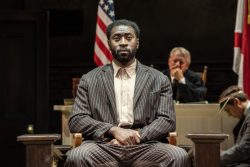 REPORT after report is published detailing “systemic” or “structural” racism in some of our major institutions. Fears of anyone “whose skin is a different shade” (as Hammerstein put it in South Pacific) fill some sections of our media, and fear of ultra right-wing action against them inform others.
REPORT after report is published detailing “systemic” or “structural” racism in some of our major institutions. Fears of anyone “whose skin is a different shade” (as Hammerstein put it in South Pacific) fill some sections of our media, and fear of ultra right-wing action against them inform others.
Harper Lee’s novel To Kill a Mockingbird is still as relevant today as when it was published in 1960, and Aaron Sorkin’s new stage adaptation brings it to frightening and helpless reality. After rapturous response on Broadway and in London to Bartlett Sher’s production, it is touring the UK and on stage in Bath.
 The story is familiar to the many thousands of students for whom it has been a set book over the decades, and to fans of the Gregory Peck 1962 film. Sorkin, creator of The West Wing, took on the challenge of updating Lee’s novel for a 21st century audience, and did it by amplifying the roles taken by the black characters as well as giving the ranting racists of Maycomb, Alabama, speeches that echo political speeches made in the past few years. Can you spot the difference? No, you certainly cannot.
The story is familiar to the many thousands of students for whom it has been a set book over the decades, and to fans of the Gregory Peck 1962 film. Sorkin, creator of The West Wing, took on the challenge of updating Lee’s novel for a 21st century audience, and did it by amplifying the roles taken by the black characters as well as giving the ranting racists of Maycomb, Alabama, speeches that echo political speeches made in the past few years. Can you spot the difference? No, you certainly cannot.
In Alabama in 1958, the allegation of a black man raping a white woman is an immediate sentence of death. No amount of evidence of the impossibility of the charge is relevant – Tom Robinson is prey to the braying mob, whether they are townsfolk or prison guards. He is a dead man walking.
 Atticus Finch is a small-town lawyer specialising in property and probate, and only at the request of his friend the judge does he take on Tom’s defence. It’s played out in the sultry heat of an Alabama summer, lush flowers blooming, insects buzzing, speech slow and drawled, negroes no longer slaves but patronised, ignored and treated as should-be-grateful possessions.
Atticus Finch is a small-town lawyer specialising in property and probate, and only at the request of his friend the judge does he take on Tom’s defence. It’s played out in the sultry heat of an Alabama summer, lush flowers blooming, insects buzzing, speech slow and drawled, negroes no longer slaves but patronised, ignored and treated as should-be-grateful possessions.
The bright Finch children, brought up by black Calpurnia after the death of their mother, want to understand what’s going on in their father’s court case, and listen with their ears pricked for inconsistencies and injustices. The negroes, segregated from church congregations and in court, listen on in silence. The famous town drunk turns out not to be drunk at all. The recluse from down the street is not the legendary monster of Maycomb. But none of it matters.
 This timeless story is performed by a 22-strong ensemble led by Richard Coyle as Atticus, a good man who believes passionately in the inherent good of mankind. Aaron Shosanya brings a gentle dignity to the condemned man, hideously contrasted to Oscar Pearce’s bullying, incestuous Bob Ewell, father of the allegedly raped girl and leading member of the town’s Ku Klux Klan. Bristol Old Vic Theatre School graduate Anna Munden is a powerful Scout Finch, the narrator of the original book and thought to be based on Harper Lee herself. Dylan Malyn is the astonishingly moving Dill Harris, with Gabriel Scott as Jem Finch, struggling with impending manhood and what it means.
This timeless story is performed by a 22-strong ensemble led by Richard Coyle as Atticus, a good man who believes passionately in the inherent good of mankind. Aaron Shosanya brings a gentle dignity to the condemned man, hideously contrasted to Oscar Pearce’s bullying, incestuous Bob Ewell, father of the allegedly raped girl and leading member of the town’s Ku Klux Klan. Bristol Old Vic Theatre School graduate Anna Munden is a powerful Scout Finch, the narrator of the original book and thought to be based on Harper Lee herself. Dylan Malyn is the astonishingly moving Dill Harris, with Gabriel Scott as Jem Finch, struggling with impending manhood and what it means.
Andrea Davy’s caring, angry Calpurnia and Stephen Boxer’s frustratedly helpless judge are balanced against the terrified, belligerent and brainwashed Mayella Ewell (Evie Hargreaves).
 To Kill a Mockingbird is so much more than a classic text and an Oscar winning film, or the latest outing for the multi-award winning Sorkin. You should watch it and weep, and when you next read those headlines – in newspapers, on TV or selectively streamed to your device of choice – look at what they really mean in 2025.
To Kill a Mockingbird is so much more than a classic text and an Oscar winning film, or the latest outing for the multi-award winning Sorkin. You should watch it and weep, and when you next read those headlines – in newspapers, on TV or selectively streamed to your device of choice – look at what they really mean in 2025.
If you miss To Kill a Mockingbird at Bath, this production will be at Plymouth Theatre Royal from 10th to 14th March and Southampton Mayflower from 24th to 28th March 2026.
GP-W
Photographs by Johan Persson